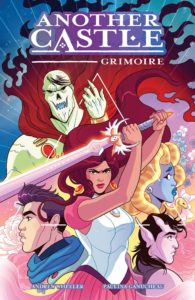Synopsis
Princess Misty of Beldora longs for a more exciting life, but gets more than she bargained for when she is captured by Lord Badlug, the ruler of the neighboring kingdom of Grimoire. He intends to marry her and conquer Beldora, leading the land into ruin and chaos. Together with the long-suffering citizens of Grimoire and a certain bumbling prince, Misty must fight to protect her kingdom and free both realms from Badlug’s tyrannical rule.
From: Oni Press
Notes on This Title
The focal character of this series, Princess Misty, is aromantic, asexual, and Latinx.
There are some depictions of fantasy violence, but it is largely implied rather than shown outright.
Awards
None.
Reviews
Starred review: “Princess Misty of Beldora has no interest in marrying a prince; she wants to live life on her own terms. But the marriage Misty’s father has in mind for her is put on hold when she is captured and taken to the neighboring kingdom of monsters, Grimoire, where she is to marry its immortal ruler, Badlug the Terrible. Going home isn’t an option until she has sought revenge on Badlug for killing her mother, and Misty’s tenacity quickly wins her an eclectic band of allies, including Gorga, a kindhearted gorgon attendant, and Fogmoth, a gay gargoyle whose ex happens to be heir to the throne of Grimoire. Wheeler delivers a feminist fantasy adventure that overturns genre conventions at every opportunity, and his diverse cast of humans and monsters underscores underlying themes about prejudices and unfair assumptions. Sharp-witted banter entertains throughout, but Wheeler also slips in deeper considerations about the authority rulers wield and what true sacrifice looks like. Ganucheau contributes some thrilling and bloody action sequences, and her candy-colored palette, suffused with bright pinks and purples, is an inspired touch, just one more way this story subverts expectations. Ages 13–up.” (Source: Publishers Weekly)
Interviews
Comicsverse: “Not Your Typical Princess Story: An Interview with ANOTHER CASTLE: GRIMOIRE Creators Andrew Wheeler and Paulina Ganucheau“

Well, the aro/ace status of the main character is not explicit but rather just based on just one line (she says she can’t tell if her arranged bridegroom is handsom or not, because she doesn’t care about such things) – but at least she doesn’t get hooked up with any love interest during the story and her plotline is entirely about non-romantic issues. So there’s nopthing preventing you from interpreting her as aro/ace, which is rare enough, I suppose.
Also, I’m not sure why anyone would tag her as a LatinX character, in particular. She’s just ambiguously brown (with black eyes but red hair) and has no cultural markers that would make her seem even just part of a fantasy counterpart culture of Latin America / Spain / Portugal. Her name (Artemisia) sounds more Italian, if anything.
By the way, I don’t see any reason why this comic shouldn’t be read by children under 13. Unless you think gay romance (with nothing more than a peck on the cheek) inherently means it’s inappropriate for pre-teens…
The violence is no worse than in a Disney movie, and the storyline is a very nice subversion of the usual fairytale logic (not just in a feminist way) that should be read as early as possible – before narcissistic nonsense like admiring aristocrats and “chosen one” heroes just for being inherently better and more important than the “little people”, and the idea that it’s okay to treat others as side characters in one’s own “hero’s adventure”, as if they have no hopes/dreams/life of their own, becomes part of the child’s general worldview. It’s also the first fairytale-style story (that wasn’t clearly meant for an adult audience) that I’ve read that had the nerve to point out in no uncertain terms that monarchy in itself – no matter if the ruler is the rightful / destined king or a good person in general – is just not a good system. Or that serious social and political problems can’t be solved by simply going in and assassinating the evil king and/or waging war on the evil kingdom while ignoring that the citizens of said kingdom had no choice in its evil actions. (After all, even many adults still think that’s a sensible approach to deal with Real Life countries ruled by bad dictators or what propaganda tells them are bad dictators, which is why they support assassinations, coups, collective punishment via economic embargoes, and outright bombings and invasions of such countries. So really, this is a deeply harmful way of thinking that people cannot unlearn early enough.)